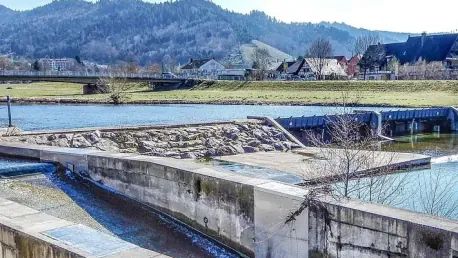The ongoing quest for more sustainable and efficient energy solutions has led to pioneering projects that reimagine the role of existing infrastructure. One such ambitious endeavor is the initiative by Burnham RNG in partnership with the Milton Regional Sewer Authority (MRSA) to transform MRSA’s wastewater treatment plant (WWTP) into a Resource Recovery Center. The main goal of this project is to maximize the use of MRSA’s existing infrastructure by accepting food waste and biosolids from local businesses and other wastewater treatment plants. Through this transformation, MRSA aims to reduce environmental impact and generate new revenue by capturing biogas produced during the wastewater treatment process and converting it into pipeline-quality renewable natural gas (RNG).
Leveraging Underutilized Infrastructure
Many wastewater treatment plants, like MRSA’s, possess underutilized anaerobic digesters, which hold significant potential for sustainable practices. Anaerobic digesters break down organic matter in the absence of oxygen, producing biogas that can be captured and converted into RNG. By optimizing these facilities, MRSA can create a sustainable solution for organic waste disposal while simultaneously generating revenue from the sale of RNG. This project not only provides an effective method for diverting waste from landfills but also offers an efficient outlet for regional food processors and other wastewater plants.
The conversion of a WWTP into a Resource Recovery Center exemplifies a broader trend toward sustainability and resource efficiency. This transformation reduces the environmental impact by preventing landfill use, lowers the carbon footprint, and creates a renewable energy source that benefits the entire community. Moreover, the additional revenue generated from selling RNG can help to lower sewage fees for existing customers, providing economic benefits on top of the environmental gains. This approach not only aligns with sustainability goals but also addresses financial challenges such as inflationary pressures.
Burnham RNG’s Comprehensive Role
Burnham RNG plays a crucial role in this transformative project, taking on responsibilities that include designing, installing, operating, and financing the necessary improvements. The company’s comprehensive involvement ensures the project’s success and highlights its ability to manage turnkey projects effectively. Supported by Ares, a substantial and experienced infrastructure investor, Burnham RNG’s involvement carries credibility and financial assurance, reinforcing the viability of the project.
MRSA views the partnership with Burnham RNG as an ambitious opportunity to lead by example in the realm of sustainable energy practices. Genie Bausinger, the executive director of MRSA, emphasizes the value of creatively maximizing the existing assets. She believes that this project demonstrates how existing infrastructure can be effectively leveraged to produce clean energy and additional revenue streams. The collaborative effort between MRSA and Burnham RNG shows that resourcefulness and innovation can drive significant advancements in municipal resource management and energy production.
Broader Implications and Future Prospects
The drive for sustainable and efficient energy solutions has inspired innovative projects that rethink the value of existing infrastructure. A notable example is the collaboration between Burnham RNG and the Milton Regional Sewer Authority (MRSA). Their goal is to overhaul MRSA’s wastewater treatment plant (WWTP) and convert it into a Resource Recovery Center. By doing so, they hope to make the most of MRSA’s current facilities by incorporating food waste and biosolids from local businesses and other wastewater treatment plants. This transformation aims not only to lessen environmental impact but also to create new streams of revenue. One key aspect of the project is to capture the biogas produced during the wastewater treatment process and refine it into pipeline-quality renewable natural gas (RNG). This cutting-edge approach offers a dual benefit: managing waste sustainably while supplying renewable energy, highlighting the potential of rethinking infrastructure for a greener future.









